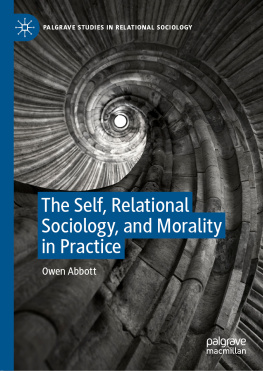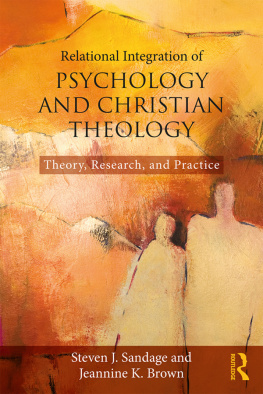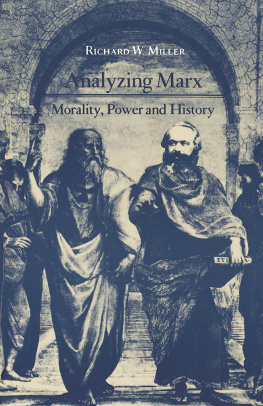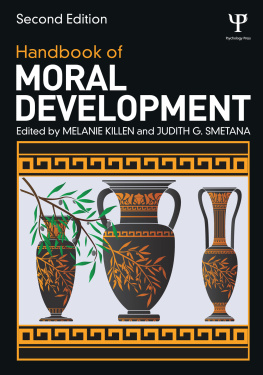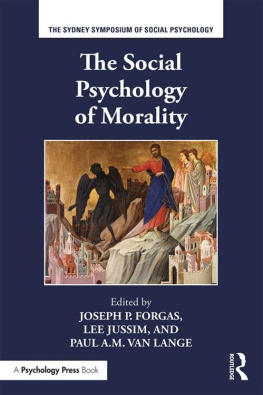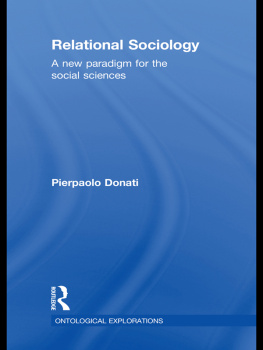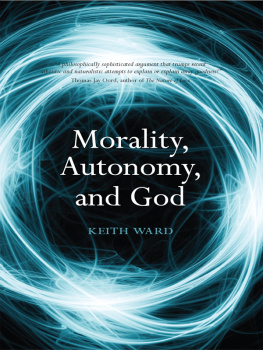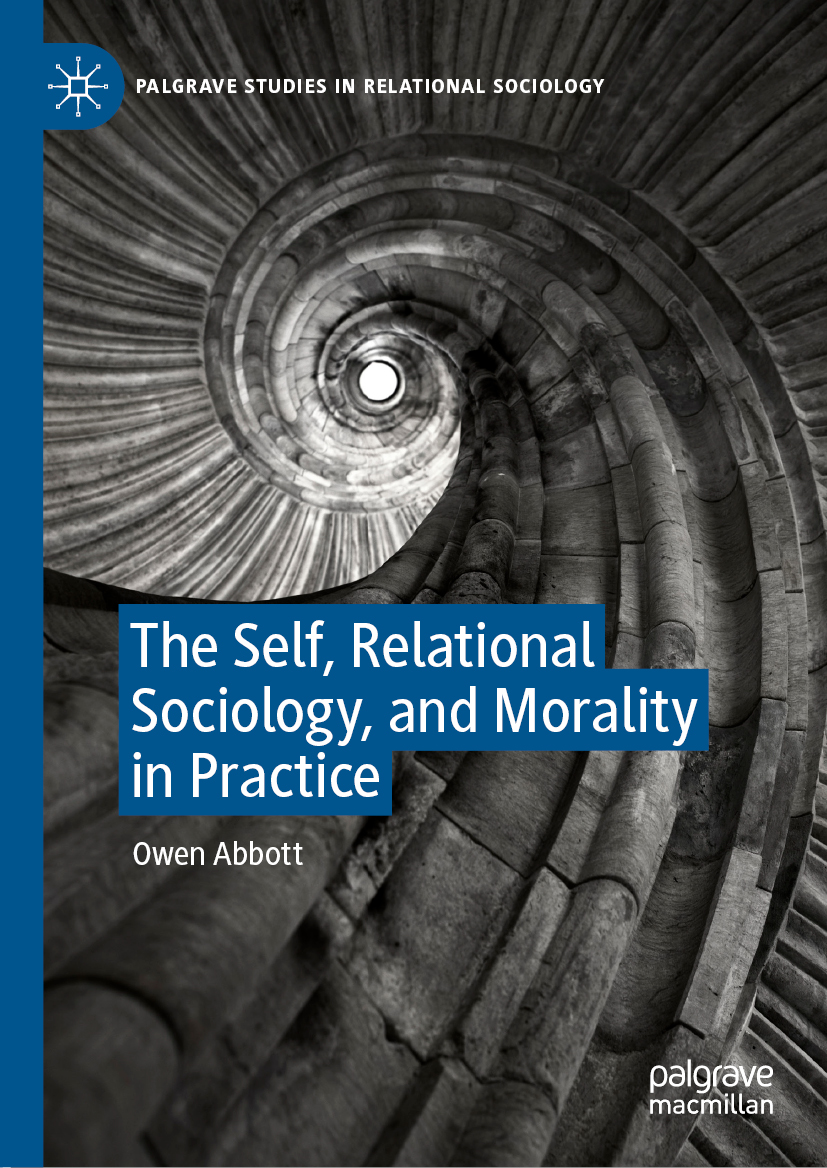Palgrave Studies in Relational Sociology
Series Editors
Nick Crossley
Department of Sociology, University of Manchester, Manchester, UK
Peeter Selg
School of Governance, Law and Society, Tallinn University, Tallinn, Estonia
In various disciplines such as archeology, psychology, psychoanalysis, international relations, and philosophy, we have seen the emergence of relational approaches or theories. This series, founded by Franois Dpelteau, seeks to further develop relational sociology through the publication of diverse theoretical and empirical researchincluding that which is critical of the relational approach. In this respect, the goal of the series is to explore the advantages and limits of relational sociology. The series welcomes contributions related to various thinkers, theories, and methods clearly associated with relational sociology (such as Bourdieu, critical realism, Deleuze, Dewey, Elias, Latour, Luhmann, Mead, network analysis, symbolic interactionism, Tarde, and Tilly). Multidisciplinary studies which are relevant to relational sociology are also welcome, as well as research on various empirical topics (such as education, family, music, health, social inequalities, international relations, feminism, ethnicity, environmental issues, politics, culture, violence, social movements, and terrorism). Relational sociologyand more specifically, this serieswill contribute to change and support contemporary sociology by discussing fundamental principles and issues within a relational framework.
More information about this series at http://www.palgrave.com/gp/series/15100
Owen Abbott
The Self, Relational Sociology, and Morality in Practice
Owen Abbott
University of Manchester, Manchester, UK
Palgrave Studies in Relational Sociology
ISBN 978-3-030-31821-5 e-ISBN 978-3-030-31822-2
https://doi.org/10.1007/978-3-030-31822-2
The Editor(s) (if applicable) and The Author(s), under exclusive license to Springer Nature Switzerland AG 2020
This work is subject to copyright. All rights are solely and exclusively licensed by the Publisher, whether the whole or part of the material is concerned, specifically the rights of translation, reprinting, reuse of illustrations, recitation, broadcasting, reproduction on microfilms or in any other physical way, and transmission or information storage and retrieval, electronic adaptation, computer software, or by similar or dissimilar methodology now known or hereafter developed.
The use of general descriptive names, registered names, trademarks, service marks, etc. in this publication does not imply, even in the absence of a specific statement, that such names are exempt from the relevant protective laws and regulations and therefore free for general use.
The publisher, the authors and the editors are safe to assume that the advice and information in this book are believed to be true and accurate at the date of publication. Neither the publisher nor the authors or the editors give a warranty, expressed or implied, with respect to the material contained herein or for any errors or omissions that may have been made. The publisher remains neutral with regard to jurisdictional claims in published maps and institutional affiliations.
Cover illustration: Philartphace/E+/Getty Images
This Palgrave Macmillan imprint is published by the registered company Springer Nature Switzerland AG
The registered company address is: Gewerbestrasse 11, 6330 Cham, Switzerland
For Sally and John Abbott, for everything they have done for me
Acknowledgements
Throughout the process of writing this book, innumerable people have gone out of their way to offer help, support, and guidance for very little reason at all other than that they are good peoplewhich is, to some extent at least, indicative of part of the point of this book. Firstly, I would like to thank Franois Dpelteau for the time he gave in assisting me with the proposal of this book. His kindness was palpable from the support he lent me, and his keenness to bring together those who work in relational sociology will be greatly missed.
Special thanks goes to Dr. Nigel Pleasants for guiding and shaping my ideas and interests as my Ph.D. supervisor, and for continuing to be wonderfully supportive in the course of bringing this book together. Since examining my Ph.D., Ian Burkitt has been kind and generous beyond belief, firstly by suggesting that my thesis may work within the Palgrave Studies in Relational Sociology series, and from there forward reading through drafts of chapters and offering instructive feedback from his position of leading expertise in the field. I owe a huge amount to Ian, and it wont ever be forgotten.
Having read much of Nick Crossleys work during my Ph.D. research, serendipitous good fortune led me to work in the same department as him at the University of Manchester, and I have been clogging up his email ever since. He has been a tremendous source of inspiration and guidance, particularly since he took over the co-editorship of the relational sociology book series in light of Franoiss untimely passing.
I am just one of a whole host of people at the University of Manchester and beyond who has benefited hugely from the profound wisdom, generosity, and humour of Wendy Bottero. In my case, Wendy has not only laid and rediverted the path of my ideas, but has also made engaging with ideas thoroughly enjoyable. I have particularly benefitted from the Pragmatism Reading group at Manchester, in which Wendy, Charlotte Branchu, Kirsty Morrin and Laura Fenton have tugged and hammered my thoughts into a hopefully passable shape, although they should bear no responsibility should this not be the case.
During my time at Manchester, I have been lucky enough to have been taken under the collective intellectual might of the Morgan Centre for Research into Everyday Lives. As even a cursory glance at my reference list will affirm, the work conducted by members of the centre has offered me a wellspring of guiding ideas that has driven my work forward.
As anyone in a similar position will attest, surviving early careers academia requires not just a great deal of support, but also kindness and friendship from within the academic world, all of which have been provided in spades by Nadim Mirshak, James Rhodes and Andrew Balmer, among many others at Manchester.
Dr. Kaine Southey and Dr. Jack Hendy provided the most wonderful environment for the completion of the Ph.D. thesis upon which this book is based, something for which I, and everyone else who revelled in the delights of Greville road, will be forever grateful. For years of friendship and intellectual stimulation, I have to thank Hywel Abbott, David Abbott, Josh Simpson, Paul Herron, Shane Jarvis, Steven Barrett, Dan OSullivan, Ricky Ketley-Prentice, Adam Ollis, Rob Dyer, Ben Wilson, Tom Arnall, Joe Rowsell, Tom Hollis, Ben Clarke, and all at Gordano RFC who gave me respite from academic tedium. Several people said they would give me a fiver if I named them in the book, so thanks also to Chris and Lee Worgan, Beaker, and Matt Stevens. The music of Spencer Flay has also helped me through the writing of this book.
Most importantly, and most deeply, I would like to thank Natalie-Anne. She has been so wonderful to me in so many ways, both personally and in her willingness to point out that what a sentence says in my head and how it reads to others are sometimes some distance from being the same thing. Her wisdom and her compassion have provided me with an irrepressible fount of inspiration and support throughout this whole process, for which I am incredibly grateful.

